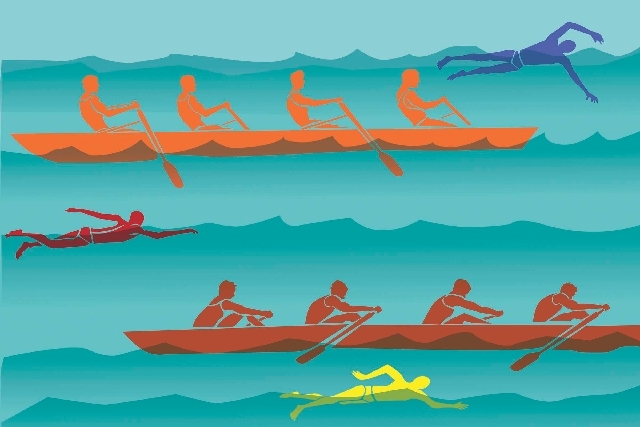Looking at how introverts or extroverts lead or follow isn’t as obvious as it might seem

Anyone will tell you things fall apart in groups. Give a task to a driven student and it gets done without a hitch. Give it to a group of students and you may need to keep your fingers crossed. There are many reasons for this, some clear-cut and others more ambiguous.
An off-the-cuff “so-and-so’s not a team player” remark can sometimes surface as an explanation for why a group or team didn’t perform as well as possible. But the comment, even if true about a particular individual, can often be knee-jerk and too simplistic when looking at the subject of team players and more individually focused personalities.
Through the years, being a team player has become a must in work, sports and life. Not being a team player is an insult indicating a person is only out for himself/herself and likely someone you don’t want to be around, explains Amy Edmondson, a Harvard professor and author of “Teaming: How Organizations Learn, Innovate, and Compete in the Knowledge Economy.”
But Edmondson and others say there are plenty of people who enjoy solitude or play smaller, more unseen, roles in groups and society that are probably not getting a fair shake in Western culture.
In sports, for example, while society claims to want a team player, there is plenty of aggrandizing of the individual when a team wins. Blame the media, many say. But even in the case of the Nobel Prize, Edmondson explains, a lead investigator is awarded the distinction. But there were many investigators over the course of years helping to achieve the goal.
“We come from a very individualistic culture. Some are more so than others. But technically the assist is every bit as important as the goal,” Edmondson adds. “We really should do a better job of recognizing all contributors.”
Nancy Lough, a professor in the educational psychology department at the University of Nevada, Las Vegas, says the notion that introverts can’t do well on teams or as leaders is an unfortunate stereotype. She points to a book by Susan Cain, “Quiet,” that looks at the “Extrovert Ideal” of current times and how the introvert can be overlooked, miscategorized or not valued.
“Introverts can be just as successful as extroverts. They might prefer to meet with smaller groups and approach it differently,” Lough says. “I think it’s important we not perceive what the media tells us as the only way or the truth.”
Lough says quiet leaders such as the tennis world’s Roger Federer, Gandhi and the first female secretary of state, Madeleine Albright, are examples of introverted leaders who have shown the world that things can get done right and that team play doesn’t have to be loud and overactive.
“Roger Federer is someone I really pay attention to. He’s not a joke-avic, but a quiet leader who goes out and demonstrates a phenomenal level of athleticism but also leadership,” she adds.
The sports world
There may be no bigger example of introvert and extrovert misunderstanding than in the world of sports. Even in youth sports, misconceptions can abound prematurely if a child prefers to play an individually focused sport such as tennis or swimming as opposed to soccer or basketball, for example. Experts say there isn’t any pre-wiring, so to speak, when looking at people who love team play and work and those who prefer more individualized efforts. These decisions are the result of life experiences and preferences that grow from parental influence and life exposure, says Brad Donahue, a professor in UNLV’s psychology department.
Graig Chow, a post-doctoral fellow in UNLV’s psychology department, says those who may choose, say tennis, over soccer, may also like the element of control over their individual performance, something that could be skewed in a team environment where outcomes can be influenced by others on a team.
“In a soccer game, you may not even see the ball half the game. If someone wants to have a lot of control over their individual performance, it could be really frustrating,” he says.
But Chow and Donahue stop short of calling this drive for control selfishness. They also point out that even individual sports such as swimming or golf are also still organized in teams, particularly at the high school and college levels. While a person is performing individually, he or she can still get feedback from coaches and team members watching, Chow explains.
Both Donahue and Chow are involved in a National Institutes of Health grant-funded study program known as The Optimum Performance Program in Sports, or TOPPS. The initiative helps to identify unique stressors college athletes have and find the best ways to work with those stressors to allow athletes to compete better but also enjoy life outside of competition.
Regardless of whether the athlete is in an individual or team sport, Donahue has found through TOPPS and previous studies that parents still have a strong influence on an athlete’s performance, attitude and actions. Sometimes this outside pressure that has become internalized could produce an inability to perform, or “choke,” in certain situations, potentially letting down a team, adding more stress to situations. One of Donahue’s goals for the TOPPS program is to better understand the role of a player’s family in his or her performance.
Both Donahue and Chow say that while there can be several influences, such as parents and other situations, on how a person may or may not bring a team player mindset to an experience, an individual’s function within a group is also a factor to consider.
“It’s important that you have to be a team player in a group as a whole, that’s pretty accurate. But I think everyone in a group has a specific role in the team’s function. As long as everyone knows their role and accepts their role, that’s very important,” Chow adds.
Work groups today
When it comes to people knowing and embracing their roles as individuals in a work group environment, leadership can be a huge factor. The leader in a group doesn’t always have to be the CEO, Edmondson also says. It can simply be someone who is relatively quiet but knows when conversation is getting unproductive and gently steers a team back on task.
“Groups can do amazing things or backfire and fall apart for a variety of reasons. But it can depend on how good the process is and how much leadership is exercised … by anyone in the process,” she adds.
Emotions can also be a factor in how a group functions and how individuals embrace their roles. In Western culture it is a long-held belief that it is inappropriate to show too much emotion at work and that energy should instead be channeled toward the task at hand. But University of Michigan psychologist and researcher Jeffrey Sanchez-Burks, who has studied teamwork in the U.S. and in other cultures, spoke last year with Psychology Today about one of his studies where he found quite the opposite to be true in Middle Eastern, East Asian and Latin American cultures. There he found emotional relationships to be just as important at work “as a relentless focus on the task at hand.”
While experts tend to agree that individuals and teams need leadership to keep the mission in focus, Edmondson also says working in the current knowledge economy can make this more difficult.
In the 1970s and earlier, for example, many companies had teams in routine production settings. An example would be an assembly line crew where the same people worked together for extended periods of time performing the same or similar tasks regularly to a point where they could anticipate one another’s behavior. This team model seemed efficient and obviously productive, Edmondson says.
But in today’s working world, there are fewer teams in general, and the teams in place tend to be project based and always in a state of flux, Edmondson notes. The faster-moving, more dynamic economy involves more knowledge and service work with virtual and global teams. Add issues such as differing jargon between departments and tensions can rise in groups.
In the knowledge economy, work is often not easily measured by physical output and production either. Outcomes tend to be pushed into the future, sometimes forcing a conclusion about an individual or team prematurely if a team feels the need to measure outcomes now.
Edmondson gives the example of a drug company not knowing the benefits of a product until years from now. Teachers, whose work can’t be measured until after a student has completed matriculation, are another example.
“You have to have a new respect for subjectivity,” she adds.
Edmondson says regardless of whether someone is considered a team player or not, human beings, in general, often bring a “fundamental cognitive error” to group work.
“We believe we see reality but it’s out of that lens of our own experience. All goes well until there’s an encounter with someone who sees something differently. Instantly we’ll conclude that there’s some deficiency in him,” she explains. “It all starts with how we see each other and the spontaneous inferences we make.”
Like the one that says introverts don’t work well in groups.


















